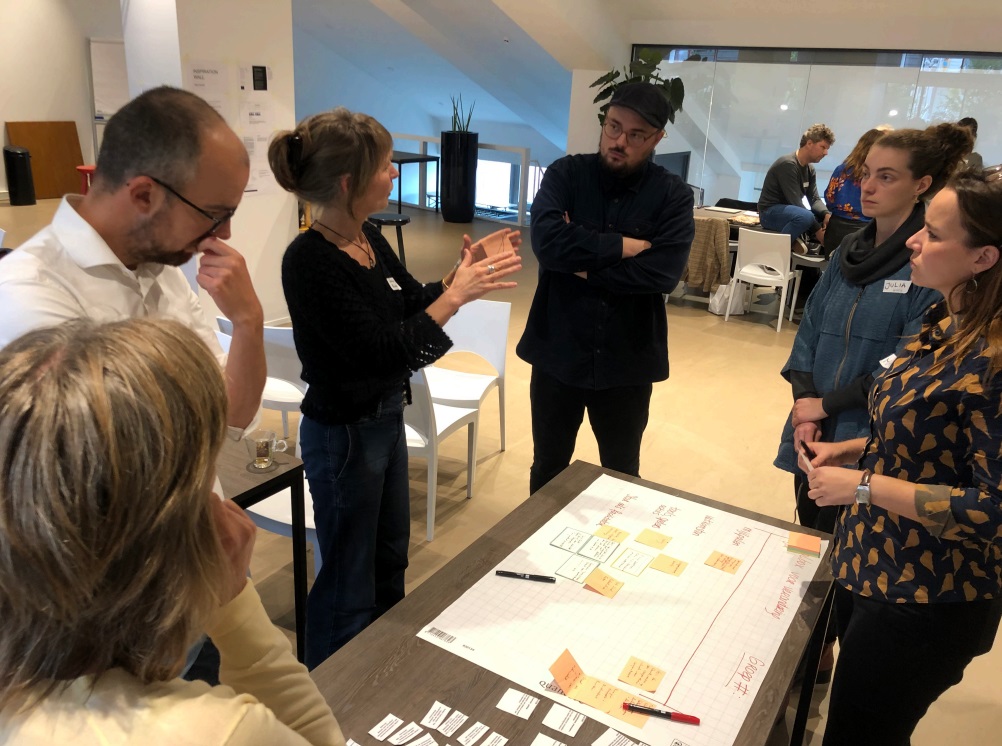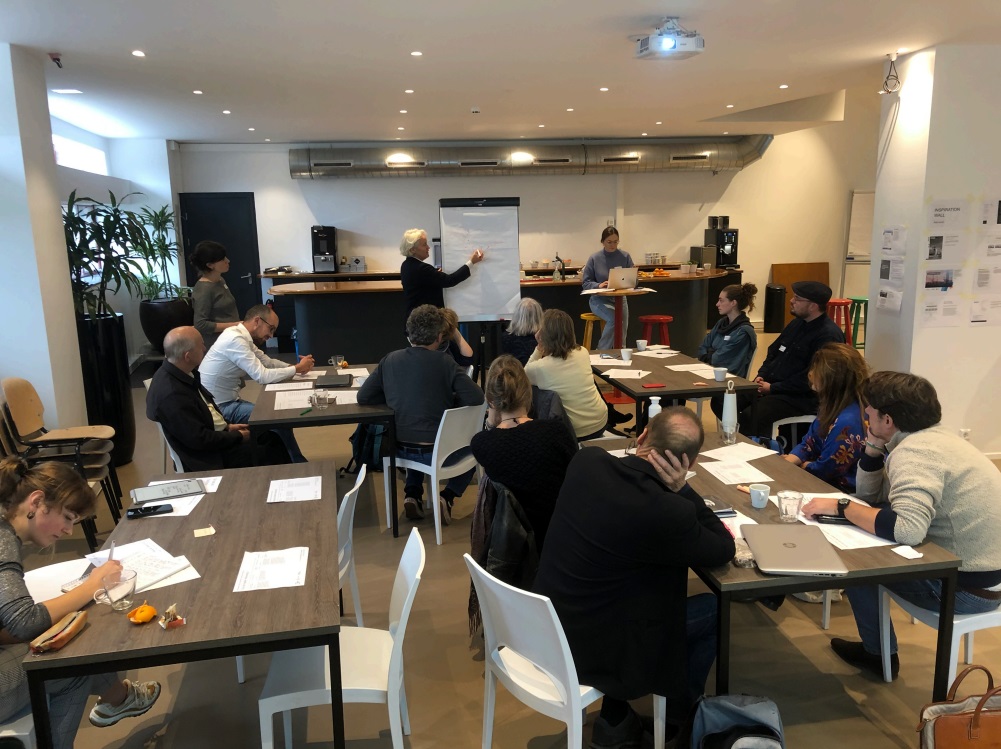Netherlands
City of Amsterdam
01-03-2021
March - December 2021
31-12-2021
 16th.
16th.
The City of Amsterdam is committed to decarbonisation and sustainable energy generation, with a goal of reducing CO2 emissions by 55% in 2030 and 95% in 2050. Communities are leading the City's transition to decarbonisation and climate resilience, requiring the City to develop a more integrated engagement approach to work alongside communities, and adopt a more experimental mindset to build capabilities for innovation. One of these approaches trialled successful in 2021 as part of the City's involvement in the EIT Climate-KIC Healthy, Clean Cities Deep Demonstration and with support of design partner Democratic Society has been a 'Toolbox for Change' workshop to explore conditions for 'Government as an Enabler' of change for energy communities to engage in actions that support decarbonisation and a democratic energy transition.
Community empowerment is the most important objective of the practice and experience, giving power and agency to citizens and grassroots groups progressing change from the ground-up for a just energy transition. IPCC's 2022 report highlights that "...collective action and social organising are crucial to shift the possibility space of public policy on climate change mitigation."
Improving public policy through the active participation of the public is also an outstanding objective of the experience, where collective action and visioning between diverse actors is demonstrably leading to change at the policymaking level, influencing new coalition agreements on the City's sustainable future.
A four-hour workshop was held with 14 participants (energy communities, member networks, civil society and civil servants) in October 2021, involving discussion of the meaning of 'Government as enabler of communities development', and group work to build a 'Toolbox for Change'.
Context
The City of Amsterdam is on its way to a community-led energy transition to decarbonisation and climate resilience, developing a more integrated engagement approach that sees it increasingly working alongside communities, and adopting a more experimental mindset that is taking civil servants out of their comfort zones and building their capabilities for innovation.
The City of Amsterdam are committed to decarbonisation and sustainable energy generation, with a goal of reducing CO2 emissions by 55% in 2030 and 95% in 2050. At the same time the City of Amsterdam has adopted an ambitious democratisation agenda, including a 'commons agenda', exploring and understanding the governance model of the commons and strengthening local structures supporting commons.
To reach these targets, the City is recognising the need to take a more socially innovative approach, creating opportunities for community-led projects to enable an energy transition that is integrated, democratic and relational, rather than siloed, technocratic and transactional. Taking this democratic approach has required the City to examine its role in enabling local community development, learning to act as a collaborator.
In 2021, through the EIT-Climate KIC Healthy, Clean Cities Deep Demonstrations consortium partnership with EIT Climate-KIC, Democratic Society, Dark Matter Labs and Materials Economics, the city progressively built capacity in tools, processes, infrastructure and new forms of governance to best support local community development, including energy transition. This has resulted in learnings for "Government as enabler of communities development" that apply to the energy transition, but also have applicability for mobility, circular economy, and other themes of energy transition.
Key communities needs highlighted:
Precedents
In 2020 the City of Amsterdam, Demsoc and other EIT-Climate KIC Healthy, Clean Cities Deep Demonstrations consortium partners conducted experiments to understand the current state of citizen engagement and climate action in Amsterdam, looking for systematic, emerging and novel engagement and climate practices, the existing range of initiatives, policies and practice, and identifying existing strengths, assets and capabilities that Amsterdam has in engaging citizens for climate action.
Four learnings emerged from the 2020 work, that directly shaped the 2021 approach to "Government as enabler of communities development" and the penultimate 'Toolbox for Change' workshop described in Methodology:
Methodology
In October 2021 the City of Amsterdam and Demsoc co-facilitated a 'Toolbox for Change' workshop in-person with energy communities, member networks and civil society to explore conditions for 'Government as an Enabler' of change for energy communities to engage in actions that support decarbonisation and a democratic energy transition. This workshop was the penultimate event of a series of community engagements conducted throughout the year to determine community needs for energy transition, including expert interviews with energy system actors working with marginalised communities.
As second in-person workshop was planned in November for the communities to pitch their Toolbox to City Aldermen at the Day of the Cooperatives, but cancelled due to returned COVID-19 restrictions. This was rescheduled to January 2022 as an online event.
Goals

Phases of the process
Phase 1: Shortlisting and recruitment of participants, energy communities (solar, wind), member networks, civil society, emphasising diverse representation where possible.
Phase 2: Workshop design.
Phase 3: Facilitation of a 4-hour workshop at Olympic Stadium, Amsterdam with 14 participants (see Impact and Results). Discussion of 'Government as enabler of communities development' meaning, building of 'Toolbox for Change' (two groups), and compare and contrasts of Toolboxes. Also included an Inspiration Wall with community-focused initiatives including the Whole Commons Catalogue.
Phase 4: Design output of the Toolbox for Change and strategy for pitching to City Aldermen.
Innovation
The Toolbox for Change workshop method was innovative in three ways:
Inclusion
A key consideration in all activities conducted across the year with communities was inclusion and diversity, seeking to centre lived experience and voices commonly marginalised in design and decision-making processes for climate action, based on principles of Design Justice. These principles acknowledge the enormous impact of design on our lives, and how those who are most affected by unintended consequences of design - such as design of policy for climate and sustainability - are those that often have the least say in decision making processes.
Prior to the Toolbox for Change workshop, we conducted a range of activities including expert interviews with energy system actors working with marginalised communities, to ensure these voice were factored into subsequent activities and programme outputs.
Communication
Participants were discussed between the City of Amsterdam and Demsoc and invited to the Toolbox for Change workshop by the City of Amsterdam by email.
The intention was to open up the Toolbox for Change to a in-person public audience at the November 2021 Day of the Cooperatives workshop (via the event website) so they could view and comment on the vision and potentially contribute to the community-led 'pitch' the City Aldermen on the day. This in-person event was cancelled due to the pandemic, and shifted to a presentation-style online event in January 2022 led by the City.
In March 2022 Demsoc and Commons Network (workshop participant) published about the work and ongoing opportunities for the City bring about just energy transition on Apolitical, a platform for public servants on innovations in government.
Articulation with other actors
Energy communities and member networks were approached by the City of Amsterdam to attend the workshop personally. The energy communities were invited based on their work and experience in Amsterdam, seeking a representation for 'heat', 'solar', 'wind' and 'energy poverty' initiatives. The invitation was accompanied by a personal note, explaining that expertise and input were important for future (public) policies.
Civil society were invited by Demsoc as peers working at intersection of art, technology, science, the 'commons', and social innovation, for broader input and knowledge exchange.
Evaluation
Anecdotal evidence was collected from participants via the City and reported to Demsoc. Those who had been skeptical about attending the workshop fearing it to be 'just another workshop with no outcome' found it surprisingly valuable.
No formal evaluation mechanisms were implemented as the EIT Climate-KIC Healthy, Clean Cities programme and its funding for Amsterdam ended in December 2021. Evaluation of practice and method efficacy arguably comes in the form of how the Toolbox for Change community vision has had cut-through with policy makers in 2022, contributing to new coalition agreements on the City's sustainable future and more specifically support for local ownership of the commons.
A set of progress markers (indicators) are specified in the Toolbox for Change output (see Annex). These include civil society actions and government actions and all actions are 'work in progress'.
Impacts and results
Describe the impacts and results of the process. How many people have participated, and which are their profiles. What have been the impacts on public policies, on the functioning of the administration and on citizens. (In a maximum of 300 words)
Toolbox for Change workshop participants (n=17)
Civil society (n=2): Waag, Commons Network
Member networks (n=2): 02025, Energie Samen
Energy communities (n=6): Amsterdam Energie, Oranje Energie, Westerlicht, WG Terrein / Ketelhuis WG, Zuiderlicht
Civil servants (n=4): City of Amsterdam
(n=3), City of Zaanstad
Spreading and iterating ideas within city networks
In November 2021 the City began working with recommendations from the Toolbox for Change with energy communities and other bilateral initiatives in motion, including a 'School of the Commons' involving other City stakeholders and changemaker networks. The City also had more detailed discussions with design partners on smart contracting, civic technology and financial models, stemming from outcomes of this work, to continue building a robust picture of possibility and systems-level change for city energy transition.
Presentation to policymakers
In January 2022 the City 'amplified the voice of citizens', pitching the Toolbox for Change vision for Amsterdam's energy transition to Aldermen on behalf of energy communities at the Day of the Cooperatives, seeking to influence budget, resourcing, policy, and new forms of governance for the City in 2022 and beyond to achieve a just energy transition, decarbonisation and other goals of social and economic wellbeing.
Adoption as part of City commitment to sustainable futures
In May 2022 the Toolbox for Change was tabled and referenced as part of council committee discussions (see TKN 95) within the energy theme of AmsterDOEN. On 25 May 2022 Amsterdam's new coalition was unveiled, with one of its key commitments being to sustainable futures with a focus on supporting local ownership of the commons, a core theme of the Toolbox and the energy community's wishes.
Summary
The City of Amsterdam is committed to decarbonisation and sustainable energy generation, with a goal of reducing CO2 emissions by 55% in 2030 and 95% in 2050. Communities are leading the City's transition to decarbonisation and climate resilience, requiring the City to develop a more integrated engagement approach to work alongside communities, and adopt a more experimental mindset to build capabilities for innovation. One of these approaches trialled successful in 2021 as part of the City's involvement in the EIT Climate-KIC Healthy, Clean Cities Deep Demonstration and with support of design partner Democratic Society has been a 'Toolbox for Change' workshop to explore conditions for 'Government as an Enabler' of change for energy communities to engage in actions that support decarbonisation and a democratic energy transition.
This workshop was the penultimate event of a series of community engagements conducted throughout the year to determine community needs for energy transition, including expert interviews with energy system actors working with marginalised communities.

The experience has demonstrated innovative, participatory methods for community empowerment and the change possible when citizens and grassroots groups progress change from the ground-up. It has also shown how active participation of the public can improve public policy with collective action and visioning between diverse actors being translated into tangible outputs for policymakers and party consideration.
A four-hour workshop was held with 14 participants (energy communities, member networks, civil society and civil servants) in October 2021, involving discussion of the meaning of 'Government as enabler of communities development', and group work to build a 'Toolbox for Change'. The Toolbox for Change sets out community-specified goals, tools, actors and actions, progress markers (indicators of change), and the Government's enabling role towards just energy transition, and specific targets of local ownership and decarbonisation by 2030-2050.
The Toolbox for Change has:
Helped spread and iterate ideas for energy transition within broader city networks and bilateral initiatives, including a 'School of the Commons' involving other City stakeholders and changemaker networks.
Been presented to City Aldermen at the January 2022 Day of the Cooperatives, to influence budget, resourcing, policy, and new forms of governance for the City in 2022 and beyond to achieve a just energy transition;
Influenced thinking on sustainable futures and local ownership of the commons at the council level, forming part of the agreements of a new coalition unveiled in May 2022.
Evaluation of practice and method efficacy has come in the form of Toolbox for Change 'cut-through' with policy makers in 2022, contributing to new coalition agreements. A set of progress markers towards just energy transition are specified in the Toolbox for Change, and are yet to be formalised into operation.
We hope this story of community empowerment and use of participatory, innovative methods to connect people with power to improve public policy will inspire others navigating local community development and ground-up approaches to climate transition.
More information
- Report resulting from the finalisation of a project task
- Amsterdam Energy Transition: Toolbox for Change reference
As part of a larger previous work (in a city that already has a rich fabric of energy communities with bottom-up origin) the experience is hardly replicable. It focusses on a very final phase (with a reduced number of actors) whose impact on larger audiences is hardly visible. Results are sounds, but still in terms of future commitments by administrative entities. Interesting link (to be deepened) with the fostering of approaches based on commoning. Strong capacity of valuing bottom-up commitments.